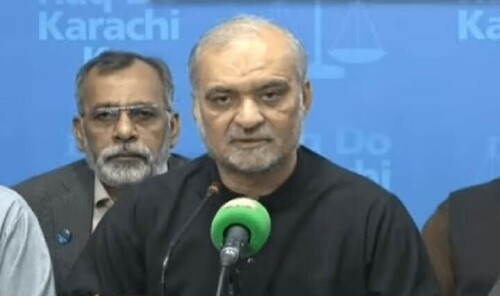KARACHI, Jan 1: The World Wide Fund for Nature-Pakistan has initiated a survey to determine critical habitat, abundance, distribution and seasonal movement pattern of small marine mammals, i.e. dolphins and porpoises in Phitti Creek system in sea, near the city. The plan would be executed in collaboration with the Hong Kong-based international organisation, Ocean Park Conservation Foundation, Deputy Director General of the WWF-Pakistan, Dr Ejaz Ahmed told APP here.
The Korangi Phitti Creek system is a part of the Indus delta which had been designated as Global-200 eco-region at an international conservation priority list adopted by the WWF and other world bodies, including UN Development Programme. Eco-regions are hot spots of biodiversity.
The survey would provide baseline data that would help in developing a strategy for conservation and management of different species of small cetaceans occurring in the Korangi Phitti creek system.
Cetacean is a general term applied to all marine and fresh-water mammals including whale, dolphin and porpoise.
The senior environment expert said the survey would also help in formulating advocacy plan with governmental agencies to reduce traffic in the area during the seasonal visits of cetacean.
Under this programme, periodic surveys would be conducted to record the abundance of small cetaceans, recording interactions with other species; record the movements through GPS and seasonal distribution pattern of small cetaceans; assessment of threats to these species; identifying critical habitat and mapping of habitat.
Besides, capacity building and participation of members of fisher-folk community in conservation of species, and holding of a consultative workshop with all stakeholders to develop a conservation and management plan is a part of this programme.
The scientist pointed out that there had been no systematic survey of marine cetacean in any of the coastal waters of Pakistan. Information on these unique creatures along the Pakistan coast also appeared scarce and very little data had been published.
Dr Ejaz Ahmed said there was a strong evidence suggesting that Pakistani waters had an undocumented high diversity of cetaceans.
Small cetaceans are mostly sighted in creeks and at the mouth of the Indus along the Sindh coast, as well as in the embayed coast and tidal lagoons on the Balochistan coast while large cetaceans are sighted off the coast.
Cetacean is believed to be diminishing, especially in the Indus delta due to ecological deterioration. They are also believed to be affected by environmental change that included noise and chemical pollution, biotoxins from harmful algal blooms, industrial activities, increase in sea traffic and increase in the salinity of water from the Indus River. Oil exploration has also begun off the Pakistan coast, according to the scientist.
He said Pakistan had raised its fish exports whereas the number of international contracts for trawlers fishing in Pakistani seas had also increased. He underlined need for urgent action to gain information on the pelagic ecosystem around Pakistan and how this affected the cetacean population to preserve and upgrade the Indus delta and marine life.—APP













































Dear visitor, the comments section is undergoing an overhaul and will return soon.